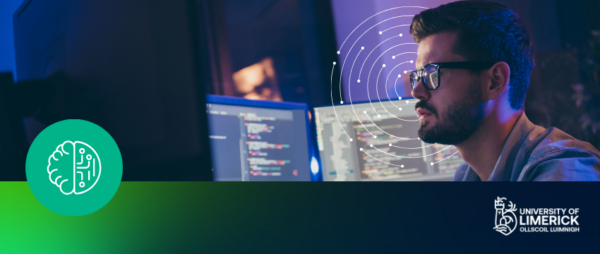Certificate in Emerging Digital Technologies
Future Technologies for Business
You’re watching AI transform industries, blockchain reshape finance, and IoT revolutionise operations. But here’s the problem: Which technologies actually matter for YOUR business? And how do you lead these conversations without feeling out of your depth?
Transform from tech-curious to tech-confident. Master the technologies reshaping your industry.
Master Technologies Reshaping Business
Artificial Intelligence – Business applications, process automation, cognitive insights
Cloud Computing & Data Analytics – Machine learning solutions, business applications
Blockchain Technology – Distributed ledgers, smart contracts, case studies
FinTech & Digital Payments – Financial technology categories, cryptocurrencies
Robotics & Autonomous Systems – Kinematics, computer vision, commercial applications
Cybersecurity & Privacy – Security fundamentals, penetration testing, IT law & ethics
Internet of Things – Hardware integration, industry standards, connected systems
VR/AR/Mixed Reality – Key distinctions, design principles, business use cases
Impact Assessment – Evaluate technology’s effect on society and business
Integration Methodologies – Industry-agnostic approaches to implementing emerging tech
Perfect For Professionals Who:
- Make business decisions but feel uncertain about technology investments
- Lead teams through digital changes but lack technical confidence
- Want to advance their career in an increasingly tech-driven world
- Run businesses and need to identify profitable tech opportunities
- Consult with clients who are asking about digital transformation
- Work in sales/marketing for companies with tech components
No technical background required – designed for business minds.
What This Programme Offers
Practical Knowledge: Frameworks to evaluate tech opportunities in your industry
Strategic Understanding: Develop confidence in technology discussions
Business Focus: Identify automation opportunities and assess vendor solutions
Career Development: Build expertise in digital strategy
Decision Support: Learn to make informed technology investment decisions
Recognised Qualification: 20 ECTS credits at Level 7 NFQ from the National College of Ireland
This Technology Ireland ICT Skillnet programme is cofunded by the Government of Ireland and the European Union. Click here to learn more about how the EU provides funding for a broad range of projects and programmes in Ireland.
Designed for Busy Professionals
100% Online – Learn from anywhere
Evening Classes – 2 evenings per week, 2 hours per lecture
12-Week Duration – One semester programme with 2 modules
Small Cohorts – Interactive learning environment
Directed eLearning – Additional self-paced study materials
Time Commitment:
- 4 hours live online classes (2 evenings × 2 hours each)
- 2 hours self-paced directed eLearning per module (videos, reading, tutorial exercises)
Format: Synchronous and asynchronous directed activities using state-of-the-art technologies and teaching techniques to support the virtual classroom.
Flexibility: All sessions are recorded and made available, though attendance is strongly advised as class engagement and group work are key aspects of the programme.
When does it start? The programme is scheduled to commence on September 23rd (subject to confirmation).
Programme Structure
The course consists of two modules: Digital Business Transformation and Emerging Digital Technologies. Both modules run concurrently over the 12-week semester, delivered through live online lectures, tutorials, and directed eLearning activities. Upon completion of this programme, you will have acquired a comprehensive set of skills and knowledge that will enable you to perform various roles and tasks within your industry.
The two modules complement each other perfectly – Module 1 provides the strategic frameworks for leading digital transformation, while Module 2 gives you practical knowledge of the technologies that drive that transformation.
Module 1: Digital Business Transformation
Learn the frameworks used by leading management consulting companies.
Core Content Areas:
- Transformation fundamentals and approaches from leading management consulting companies (McKinsey, Bain, BCG)
- Six guiding principles of digital business transformation: transformation, holistic, response, innovation, value, enterprise
- Strategic analysis frameworks including Porter’s Five Forces Analysis and strategy canvas benchmarking tools
- Global trends analysis using the 17 Sustainable Development Goals (SDGs) framework
- Business strategy fundamentals covering governance, business models, leadership mindset, and workforce culture
- Value creation and measurement including value vs. cost-driven models and innovation methodologies
- Transformation process following the continuum: discover, define, ideate, prioritise, plan, execute, evaluate
- Stakeholder management and resource alignment with project management principles
- User experience design including customer journey mapping and user requirements identification
- Prototyping approaches covering low vs. high fidelity prototypes, testing, and beta validation
- Success measurement with key metrics and value mapping for digital transformation initiatives
- Transformation culture including reflection practices, lessons learned, and roadmap expansion
Learning Outcomes: Investigate market forces, identify core principles and frameworks, design and implement transformation solutions, explain and justify emerging technology applications.
Assessment: Individual continuous assessment with two assignment submissions covering complete curriculum.
Module 2: Emerging Digital Technologies
Comprehensive study of 10 technology areas with business applications.
Technology Areas Covered:
- Artificial Intelligence – Key definitions, Artificial Narrow vs. General Intelligence, business benefits, process automation, cognitive insights, application case studies
- Cloud Computing & Data Analytics – Machine learning cloud-based solutions, business applications of data analytics
- Blockchain Technology – Core concepts, distributed ledgers, smart contracts, real-world case studies
- FinTech & Digital Payments – FinTech categories, cryptocurrencies, payment innovations, applications and case studies
- Robotics & Autonomous Systems – Kinematics, computer vision, autonomous systems, commercial applications including drones in logistics
- Cybersecurity & Privacy – Security fundamentals, principles of penetration testing, cryptography, IT law and ethics
- Internet of Things – IoT concepts and standards, hardware components, hardware/software integration
- Virtual, Augmented & Mixed Reality – Key distinctions between VR/AR/MR, design principles, business use cases
- Impact Assessment – Analysis of technology’s effect on society and business across industries
- Integration Methodologies – Industry-agnostic approaches for implementing emerging technologies to innovate, automate, and simplify business practice
Learning Outcomes: Understand the role of emerging technologies in business, distinguish key definitions and components, assess impact across industries, evaluate integration approaches and methodologies.
Assessment: Group project with two submission parts covering complete module curriculum.
We recommend all students watch the information webinar recording below to learn more about the course and hear from a previous learner about their experience.
Chapter timestamps:
Academic Eligibility
A minimum of a Level 6 qualification on the NFQ (National Framework of Qualifications) is required for standard entry.
For candidates who do not meet this minimum entry requirement, the college operates a Recognition of Prior Experiential Learning (RPEL) scheme whereby applicants may be considered based on relevant work or other experiences.
For applicants whose first language is not English, please note the English language entry requirements.
Fees
Full course fee: €1,700
Technology Ireland ICT Skillnet grant: €401
Subsidised course fee: €1,299*
Subsidised fees are only available to eligible* applicants.
*Funding Eligibility
Applicants must be working in a private or commercial semi-state organisation registered in the Republic of Ireland (Business, Consultant, Freelancer) to avail of the grant-aided fees. As a government-funded training network, we can only support those meeting these criteria with funding towards courses.
Public sector employees, non-profits, or charitable organisations that do not meet our funding criteria may apply privately for the full course fee once places are available.
Are you currently unemployed?
Unfortunately, due to our funding parameters, we are unable to accept unemployed applicants for either funded or private places. However, we encourage you to explore Future in Tech, which offers upskilling opportunities specifically designed for job seekers. You can find more details here: https://futureintech.ie/ or some of our fully funded offerings https://ictskillnet.ie/fully-funded-courses/
Once you have received your offer of a place on the course, please be aware that we have a limited number of subsidised places available. Due to high demand, we cannot hold places without payment. To ensure fairness, priority for these places will be granted to those who have both completed full payment of the subsidised fee and are deemed eligible by the college or training provider.
Ready to Start Your Digital Transformation Journey?
Simple 4-Step Application Process:
Step 1: Submit Your Interest
Use the enquiry or application buttons on this page to submit your interest.
Step 2: Eligibility Confirmation
The Technology Ireland ICT Skillnet team will contact you within 3 business days to confirm your funding eligibility and guide you through the next steps.
Step 3: Complete Your College Application
Once confirmed as eligible, you’ll be supplied a link to complete your official application with National College of Ireland (NCI), providing them directly with your CV, transcripts, and English language results (if required).
Step 4: Secure Your Place
Upon receiving a conditional offer, ICT Skillnet will provide you with payment information. You’ll complete registration with both Technology Ireland ICT Skillnet and NCI. Successful applicants become official NCI students with access to all college resources and support services.
Important Information:
- Limited Places Available: Start the process today
- Early Application Recommended: Spaces are allocated on a first-come, first-served basis among eligible candidates
- Academic Assessment: NCI conducts the final academic review and makes admission decisions
- Full Support: Our team guides you through every step of the application process
Questions? The programme Lead responsible for the course will revert to your enquiry/application please respond to her with any questions directly – we’re here to help make your application as smooth as possible.
Student Testimonial
The challenge faced by the majority of decision makers is attempting to understand which technologies will beneficially impact business and deliver value to the bottom line. Watch our testimonial video with John O’Shanahan, Managing Director at LeanBPI, as he explains how the online and part-time Certificate in Emerging Digital Technologies course helped him, and his business, facilitate a tech-driven digital transformation.





